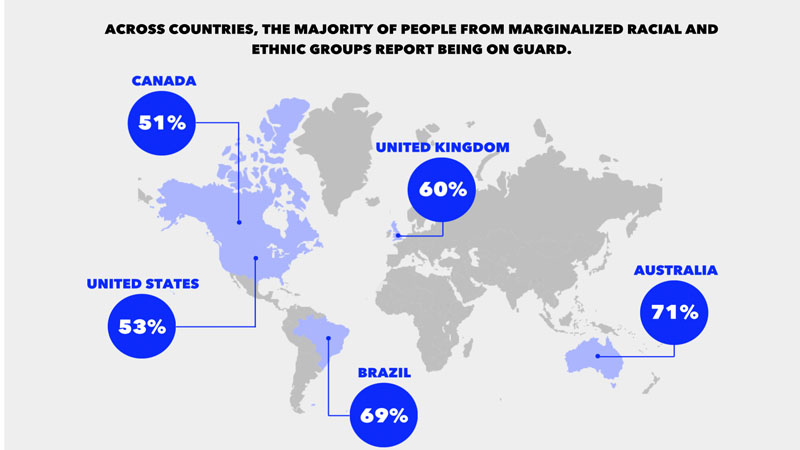More than six out of 10 employees from marginalised racial and ethnic groups say they are constantly on guard to protect themselves from race, ethnicity, or gender bias at work, according to new global research.
The latest research conducted by Catalyst, a non-profit creating workspaces that work for women, found that 61% of employees from marginalised racial and ethnic groups worldwide are on guard against bias and discrimination from their team members. These emotionally taxing experiences – and the associated effects on well-being and ability to thrive at work – are prevalent in Australia, Brazil, Canada, the UK and US.
The report, Emotional Tax on Work Teams: A View From Five Countries, shows that team members from racially and ethnically marginalised groups are under constant threat of bias within their work teams, which affects their ability to thrive at work. Instead, they stay on guard to protect themselves from intentional and unintentional experiences of bias. This includes bracing for insults, avoiding certain situations and places, and changing the way they look to protect against being stereotyped by others. This experience of constantly being on guard against bias because of race, ethnicity and gender is described in the report as emotional tax that employees from marginalised racial and ethnic groups pay in the workplace.
WORKING EMOTIONAL TAX
In fact, the majority of employees from marginalised racial and ethnic groups report being on guard for bias in each country. For example, on average, 71% of employees from marginalised racial or ethnic groups working in Australia are on guard for bias in their work teams, followed by 69% in Brazil, 60% in the UK, 53% in Canada and 51% in the US.

LGBTQ+ employees from marginalised racial and ethnic groups are highly on guard against bias within their work teams (74%), with the figure soaring to 85% for transgender and nonbinary employees. Women (56%) and men (54%) from marginalised racial and ethnic groups are on guard against bias within their work teams at similar rates.
EMOTIONALLY TAXING
“The emotional tax people from marginalised racial and ethnic groups experience in the workplace is persistent, pervasive, and global,” stated Catalyst President and CEO Lorraine Hariton. “Companies must take intentional action to create safe, empowering and inclusive work environments. where this burden is lifted and all employees can thrive.”

Too often, experiences of racism are “construed as something that happens ‘out there’ rather than right here”, said report author Sheila Brassel. The data shows with clarity that that idea is “patently false”. “Around the world, people from marginalised ethnic and racial groups are under a near constant threat of bias in their work teams,” Brassel added.
PSYCHOLOGICAL SAFETY & DIVERSITY
However, businesses and teams cannot reach their full potential when talented and valuable employees are experiencing emotional tax. The report reveals two ways that organisations can mitigate this. They include:
- Team climate for psychological safety.
- Team racial and ethnic diversity.
In short, the more psychologically safe and racially and ethnically diverse a team is, the less likely team members from marginalised racial and ethnic groups will be on guard.
BENEFITS OF INCLUSION
When employees from marginalised racial and ethnic groups are less on guard, they are three times more likely to:
- Intend to stay in their organisation.
- Be engaged or emotionally invested in their work and their company mission.
- Experience team cohesion – connection among team members as they work toward a common goal.
- Report effective team problem-solving.
They are also four times more likely to experience inclusion – feel valued, trusted, authentic, and psychologically safe at work.
MITIGATING EMOTIONAL TAX
Senior and team leaders can play a vital role in mitigating their colleagues’ experiences of emotional tax and create more inclusive and equitable workplaces. They advise leaders to:
- Be honest, walk the talk and communicate authentically and proactively to share what they’re learning with other senior leaders.
- Build bridges by enacting programmes that help employees communicate. Understand one another by making sure people from different cultural, ethnic, and racial backgrounds are valued and their stories are heard.
- Reward change by creating policies that hold leaders at all levels of the organisation accountable by tying DEI goals to compensation/incentives.
- Upskill everyone by investing in inclusive leadership training so that team leaders have the skills and experience to create inclusive team norms.
Click here to read the full report.







































